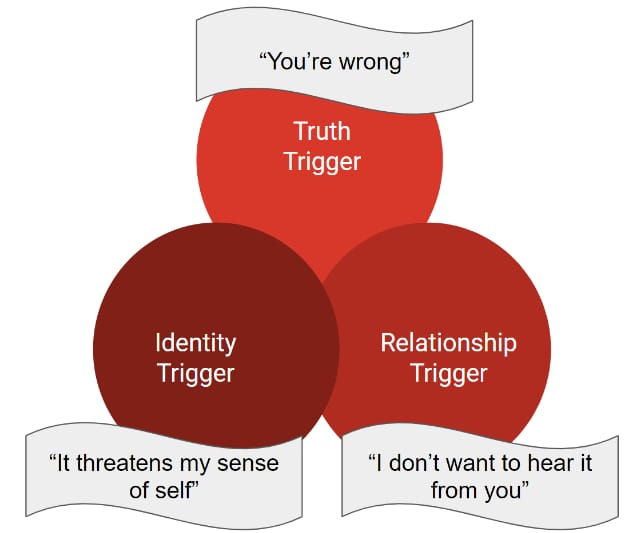- The PowerPlay Team Success Newsletter
- Posts
- On Delivering Feedback Better
On Delivering Feedback Better
1 Strategy + 1 Quote + 1 Question…
…to help you and your team thrive

This Week’s Topic: The Feedback Triggers
First off, thank you to everyone who voted for this week’s newsletter topic!
“How to Deliver Better Feedback” captured the overwhelming majority of votes.
And speaking of feedback, I love getting it! Please continue to let me know what leadership and team challenges are most important to you so I can tailor my newsletter content accordingly.
Here we go!
1 Strategy 🎯
2012 was a tough year.
I was in an unhealthy relationship, spending too much time at the bar, working a job I didn't enjoy, and up to my eyeballs in student loan debt.
I made an appointment with a therapist and spent the entire first session word-vomiting my laundry list of issues.
A few appointments later, she shared some feedback:
"You're not ready to change, and I don't feel comfortable taking your money".
I was dumbfounded.
What an unprofessional thing for a therapist to say!
In hindsight, her feedback was 100% accurate. I wanted to vent, not change.
The feedback fell on deaf ears because it triggered an automatic response in me that blinded me to the truth.
Making the choice to share constructive feedback is inherently risky.
What if my feedback is wrong or misguided?
What if they ignore my feedback?
What if it escalates into an argument?
What if it damages the relationship?
You don't want to be mean or unfair, so you agonize, ruminate, postpone, prepare a script, or just avoid the conversation altogether.
You may try and strip any emotionality from the conversations, believing that if you can package the feedback as purely objective and logical, the feedback receiver will have no choice but to accept it as fact.
But regardless of how much you prepare, there is always the possibility of triggering an unpleasant response.
That's the bad news.
The good news is that there are only 3 ways that feedback can trigger a negative response, and once you recognize these triggers as a fact of life, you'll be better equipped at both giving AND receiving feedback.
The 3 feedback triggers come from Douglas Stone and Sheila Heen, founding members of the Harvard Negotiation Project, and authors of the best-selling book "Thanks for the Feedback: The Science and Art of Receiving Feedback Well".
#1: The Truth Trigger
This feedback trigger is activated by the substance of the feedback itself. The receiver perceives the feedback as unhelpful, misguided or simply untrue.
#2: The Relationship Trigger
This switch gets flipped because it’s coming from you. For example, you might be very comfortable receiving critical feedback from your manager after a client meeting goes awry, but you’re probably less willing accept the same feedback from a more junior colleague who joined the team last week.
#3: The Identity Trigger
This trigger is activated not by the accuracy or source of the feedback, but because the feedback conflicts with the receiver’s sense of self. For example, if your identity is tied to being the highest performer on the team, you will likely have a hard time accepting a 4 out of 5 rating at your annual performance review, even if the feedback is delivered perfectly.
I like to simplify the three feedback triggers like this:

For high-stakes feedback conversations like annual performance reviews, using a structured feedback model can be helpful, and there are many to choose from.
But often the most effective feedback is delivered casually, in real-time. And working through a 5-step journaling process is overkill for 90% of situations that call for feedback.
Instead, you can approach feedback conversations with more confidence, and reduce the likelihood of a Feedback Trigger sabotaging the conversation, by asking yourself three questions:
Is the feedback true? (Truth)
Should it really come from me? (Relationship)
Is it personal? (Identity)
While there's never a guarantee that your feedback will be embraced with open arms, you can rest assured that you delivered the feedback from a place of compassion and empathy.
1 Quote 📜
Withholding feedback is choosing comfort over growth
1 Question 🤔
When was the last time you had a knee-jerk negative reaction to a piece of feedback, and can you attribute your reaction to one of the 3 feedback triggers?
Let me know if this topic resonates with you, and don’t hesitate to flex your feedback muscles by sharing a piece of constructive feedback about this week’s newsletter =)
See you next Wednesday,
Darin
(If you’re new here, feel free to sign up using the subscribe button below)